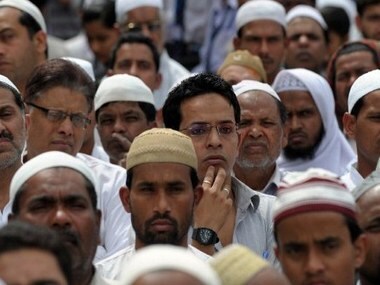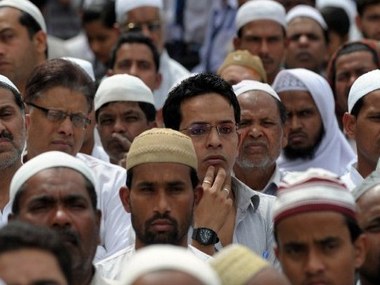Prime Minister Narendra Modi has, in an address and interaction with Muslim leaders, stated that he does not believe in politics that seeks to divide on communal lines and that he will never speak the language of communalism. On the face of it, the statement seems fine and even welcome. But it is difficult to believe that PM Modi is speaking from his heart. [caption id=“attachment_2282630” align=“alignleft” width=“380”] The Modi government needs to adopt a new approach to the Muslims of India. AFP[/caption] The reasons pertain to the nature of the BJP and its allied, sister organisations, the Sangh Parivar. The BJP, as is well known, draws sustenance - ideological and political - from the Sangh Parivar. The Parivar’s ideology , antedilivuan as it is, is clear cut: it wants the ingress of Hinduism on the Indian state. In other words, the Indian state should be Hinduised and its character should reflect the character and nature of politicised Hinduism. In this scheme, minorities should know their place and can exist only as second-class citizens. Failing this, they should migrate. Given the ideological underpinnings of the Parivar and its relationship with the BJP, what are we to make of PM Modi’s statement? Does it reflect a volte face by PM Modi? Or is he being disingenuous? Is he playing to the gallery and co-opting what is held to be the Muslim elite? Do Indian Muslims need mere assurances? Or do Muslims in India need something more and beyond? There’s two perspectives or takes on PM Modi’s assertions: power has either made him or his party, the BJP, pragmatic. The very diversity of the Indian society has made powers that be in the BJP realise that India cannot be subsumed under a homogenous, Hindutvised straitjacket and that minorities in India have to be accommodated. Another take, albeit a cynical one, lends itself to the assessment that PM Modi is co-opting what is held to be the Muslim elite, in an attempt to put ‘lip gloss’ on the core ideology of the BJP and garner support and votes. Either way, the approach adopted by PM Modi is flawed. Muslims in post-partition India have been victims of rhetorical excesses and have been used as vote banks. A certain leadership believed fallaciously to be representative of Muslims in India, has been identified and then coaxed, cajoled and mollycoddled by various political groups. This approach has merely meant instrumentalisation of Muslims in India; they have been used as a sullen mass for votes and vote bank politics. Ironically, the quid pro quo that Muslims have received has been in the nature of sops, especially for the Mullah elite, leaving the mass of Muslims in a terrible and miserable condition. PM Modi, even if he is serious, is repeating history here. So what do Muslims in India need? Indian Muslims, like elsewhere in the world, are in the midst of structural change. A new and young cohort is replacing an older cohort. Call them Millenial Muslims, they are aspirational and want a good life but structural conditions - illiteracy, poverty and discriminations - preclude the translation of their aspirations into reality. What they need and perhaps even want are opportunities, development and a dignified life wherein culture and religion are not sacrificed at the altar of progress. There then is a disconnect between Millenial Muslims and the Mullahs who claim to represent them and are usually held as the Muslim community’s leaders. Millenial Muslims are modernist Muslims in terms of their aspirations but as suggested, this Muslim Modernism jars with the backwardness of Mullahs. The real and existing need of Muslim Millenials is education and development. It is here that the state should focus on. Co-optation of Mullahs and using them as a link to the broader community is short-termist and defeatist. Muslims in India need to improve their condition and lot; this can only happen when the political economy of their condition is aligned with the broader political economy of the state and even markets. Alas, this does not seem to be recognized by powers that be. Hackneyed approaches are once again being trotted out either for instrumentalist or political reasons. This approach can, given the nature of the Muslim Millenials, boomerang. India is changing, the world is changing and so have the Muslim Millenials but the underlying structural conditions remain the same. It is to this underlying, abysmal conditions that attention should be focused on; not on formulaic approaches that have only retarded and regressed the Muslim condition in India.
The Modi government needs to adopt a new approach to the Muslims of India. AFP[/caption] The reasons pertain to the nature of the BJP and its allied, sister organisations, the Sangh Parivar. The BJP, as is well known, draws sustenance - ideological and political - from the Sangh Parivar. The Parivar’s ideology , antedilivuan as it is, is clear cut: it wants the ingress of Hinduism on the Indian state. In other words, the Indian state should be Hinduised and its character should reflect the character and nature of politicised Hinduism. In this scheme, minorities should know their place and can exist only as second-class citizens. Failing this, they should migrate. Given the ideological underpinnings of the Parivar and its relationship with the BJP, what are we to make of PM Modi’s statement? Does it reflect a volte face by PM Modi? Or is he being disingenuous? Is he playing to the gallery and co-opting what is held to be the Muslim elite? Do Indian Muslims need mere assurances? Or do Muslims in India need something more and beyond? There’s two perspectives or takes on PM Modi’s assertions: power has either made him or his party, the BJP, pragmatic. The very diversity of the Indian society has made powers that be in the BJP realise that India cannot be subsumed under a homogenous, Hindutvised straitjacket and that minorities in India have to be accommodated. Another take, albeit a cynical one, lends itself to the assessment that PM Modi is co-opting what is held to be the Muslim elite, in an attempt to put ‘lip gloss’ on the core ideology of the BJP and garner support and votes. Either way, the approach adopted by PM Modi is flawed. Muslims in post-partition India have been victims of rhetorical excesses and have been used as vote banks. A certain leadership believed fallaciously to be representative of Muslims in India, has been identified and then coaxed, cajoled and mollycoddled by various political groups. This approach has merely meant instrumentalisation of Muslims in India; they have been used as a sullen mass for votes and vote bank politics. Ironically, the quid pro quo that Muslims have received has been in the nature of sops, especially for the Mullah elite, leaving the mass of Muslims in a terrible and miserable condition. PM Modi, even if he is serious, is repeating history here. So what do Muslims in India need? Indian Muslims, like elsewhere in the world, are in the midst of structural change. A new and young cohort is replacing an older cohort. Call them Millenial Muslims, they are aspirational and want a good life but structural conditions - illiteracy, poverty and discriminations - preclude the translation of their aspirations into reality. What they need and perhaps even want are opportunities, development and a dignified life wherein culture and religion are not sacrificed at the altar of progress. There then is a disconnect between Millenial Muslims and the Mullahs who claim to represent them and are usually held as the Muslim community’s leaders. Millenial Muslims are modernist Muslims in terms of their aspirations but as suggested, this Muslim Modernism jars with the backwardness of Mullahs. The real and existing need of Muslim Millenials is education and development. It is here that the state should focus on. Co-optation of Mullahs and using them as a link to the broader community is short-termist and defeatist. Muslims in India need to improve their condition and lot; this can only happen when the political economy of their condition is aligned with the broader political economy of the state and even markets. Alas, this does not seem to be recognized by powers that be. Hackneyed approaches are once again being trotted out either for instrumentalist or political reasons. This approach can, given the nature of the Muslim Millenials, boomerang. India is changing, the world is changing and so have the Muslim Millenials but the underlying structural conditions remain the same. It is to this underlying, abysmal conditions that attention should be focused on; not on formulaic approaches that have only retarded and regressed the Muslim condition in India.
India’s Muslim Millenials: Why Modi's approach towards the community is wrong
Wajahat Qazi
• June 6, 2015, 13:19:44 IST
Modi govt needs to realise that Indian Muslims, like elsewhere in the world, are in the midst of structural change.
Advertisement
)
End of Article